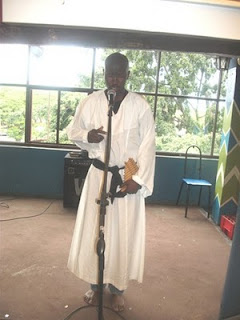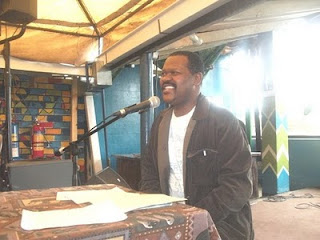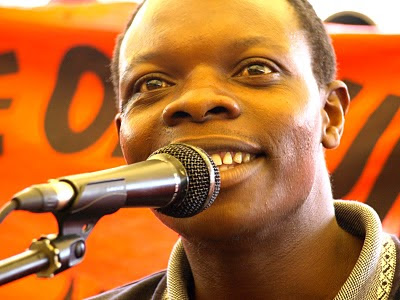11 December was a writers’ world; minds went up in a fiery passion for the written and spoken word.
Despite kicking off late because of the morning rains, the Win-Zimbabwe’s bonus event for the year 2010, Writers’ End of Year Get Together, held at the Book Café, was a place to be, with sizzling performances, presentations, and debates. Within the nearly two and half-hours, the house witnessed a love and togetherness that is purely literary, true, and happy. How pleasant it felt to notice writers coming together with their spouses and kids.
All the confirmed three presenters arrived earlier than the other invited participants whom we feared could decide to let the event pass due to the rains. However, it was the day the Lord had made.
Epworth-based Hatineti Mbira Crew, a four-member group, launched the Get-Together with cool rhythmic traditional vibes. Given the cultural environment at the Book Cafe, mbira sounds put you in the spirit of Africa, peaceful and rich.
Writers began to trickle in twos and threes and suddenly the show gained momentum. The rains either were forgotten or had ceased outside. Inside the Book Café, the aura had changed.
In her opening remarks, Writers International Network Zimbabwe Board Chairperson Josephine Muganiwa said Win-Zimbabwe has witnessed tremendous growth since its inception in January this year. She said despite challenges, the organization decided to organize this Get Together as a way of celebrating writing and performing talent just as any other artists.
One of the country’s accomplished dub poets and musician Albert Nyathi gave an illuminating presentation about the Origins of Praise Poetry, particularly in Ndebele culture.
Nyathi noted that in the past a praise poet, known as an imbongi in Ndebele, played an important role in the village as the King’s public critic. An imbongi represented community views and he would convey ‘people opinion’ to the King at public functions through praise poetry. Nyathi also said the word ‘praise’ meant a lot of things and it should not mislead people into believing that an imbongi always showered the King with praise even when the people were suffering. Naturally, the imbongi served as the King’s adviser.
African praise poetry belonged to different clans, said Nyathi who added that an imbongi would touch on different things such as religion, public opinion, and community politics. Totems are another form of praise poetry used when someone did anything benefiting the family. According to Nyathi, praise poetry responded to the socio-economic situations affecting the people.
Asked during discussions if there were no female praise poets in those days Nyathi said he knew of a few but acknowledged the reciting of totems by women as an indication that women were also involved in oral poetry.
Performance poet Tinashe Mutumwapavi Muchuri said training is an important element in a poet’s career, particularly when the poet uses the stage. After presenting a poem in segments, pretending to be forgetting the lines, he explained later that this could be the result of lack of training. He gave an example of how a pair of youths was dragged from the stage where they were badly performing in Bulawayo. The youths, Muchuri said, were reportedly drunk. He stressed that had the youths been trained on pre-performance behavior, they would not have shamed themselves in front of the audience.
Muchuri’s presentation got some weight from Nyathi who urged the performers not to drink or use drugs before they get to the stage because this extremely spoils the show. Nyathi talked of one of his shows where he performed after having taken multiple swigs of beer. He said the show was terrible and from this, he leant that a performer is also a worker and it does not serve well to go to work drunk or on drugs.
“In 2007, there were some poets who were excommunicated from the adjudicating team of a certain sponsored spoken poetry competition because of unbecoming behavior instigated by alcohol,” said Muchuri.
Poetry workshops, he observed, create opportunities of learning and groom the poet into becoming a professional being.
Virginia Phiri, author of three gripping novels that touch on taboos or controversial subjects, presented a paper titled Writing: Eyes, Ears, and Mouth as Witnesses.
She began her presentation by thanking Win-Zimbabwe for inviting writers of all lifestyles.
“Numerous private writers get together events have taken place but this one is different and special. Looking at the invitation list of WIN Zimbabwe it seems to have taken care of writers of all lifestyles. It is therefore appropriate to congratulate WIN Zimbabwe for this foresight. I am sure that this event will attract other players in the literary circles such as publishers, copyright administrators and booksellers to take part in future events,” she said.
After also taking the writers back in time to her days when she was involved with helpful established authors, Phiri articulated the relationship existent between the eyes, the ears and the mouth, saying these three organs are instrumental to the growth of a budding writer. The eyes stand for observation, the skill “to have a closer and critical look at possible settings, situations and characters on the chosen topic”.
Phiri also added that the eyes enable us to read extensively as this is advisable for both seasoned and budding writers. She said that even the blind people use their ‘sixth’ sense to see.
“A good example is the case of a blind young man Nathan Zaranyika whose story appeared in the Newsday of December 4. He is quoted as having said “I can see obstacles about twenty metres away”. Artificial eye aids such as spectacles and contact lenses do help those who are short sighted,” said Phiri.
As for the ears’ role, she said ‘attention’ is crucial, as this would be of great help where dialogue will be used in books, plays and film scripts.
“For intense non-fiction work artificial ears such as tape recorders assist a great deal in conducting interviews for purposes of getting information for use in writing,” explained Phiri.
She added that the mouth is best used in conjunction with the eyes and ears to get the desired result. The mouth features prominently in showing off writing through public readings, recitals, acting and singing for purposes of entertainment, education and worship, said Phiri.
Phiri presentation also touched on the local languages, which she said are in bad state. She urged writers to be proud of their mother languages and write in those languages to avoid their extinction.
“The poor examination results at schools are an indication that all is not well. It would be a good idea if the Zimbabwe African Languages Writers Association (ZALWA) could be revived,” she said.
In between the presentations, there were spectacular performances and readings by poets and writers such as Patrick Hwande, Cynthia Flowchyld Marangwanda, PSP (Police State Poet), Barbra Anderson, Mbizo Chirasha, Julius Chingono (did a poem called Dai), Memory Chirere (read from his collection Tudikidiki), and Phillip Chidavaenzi (read from work in progress) and Nqobile Madzibaba Malinga who was backed by three girls from Bulawayo.
Mr. Chirumbwana who brought two students, without the poet Tilda Gozho who was on the programme, represented Glen View 2 High School. Another school, Vimbai High in Norton, did not make it.
Well-known motivational speaker and publisher, Noah Mangwarara (Veriest Solutions International), came in with book prizes, which he gave away. “There is no sweetness without sweat and there is no pleasure without pain,” he told the audience in his inspiring speech.
Gracing the occasion also were David Mungoshi (The Fading Sun), Mashingaidze Gomo (A Fine Madness), Beatrice Sithole and Ruby Magosvongwe (ZIBF Board) and many other artists.
"Writers' Get-Together In Pictures" in our next issue.































 Albert Nyathi
Albert Nyathi